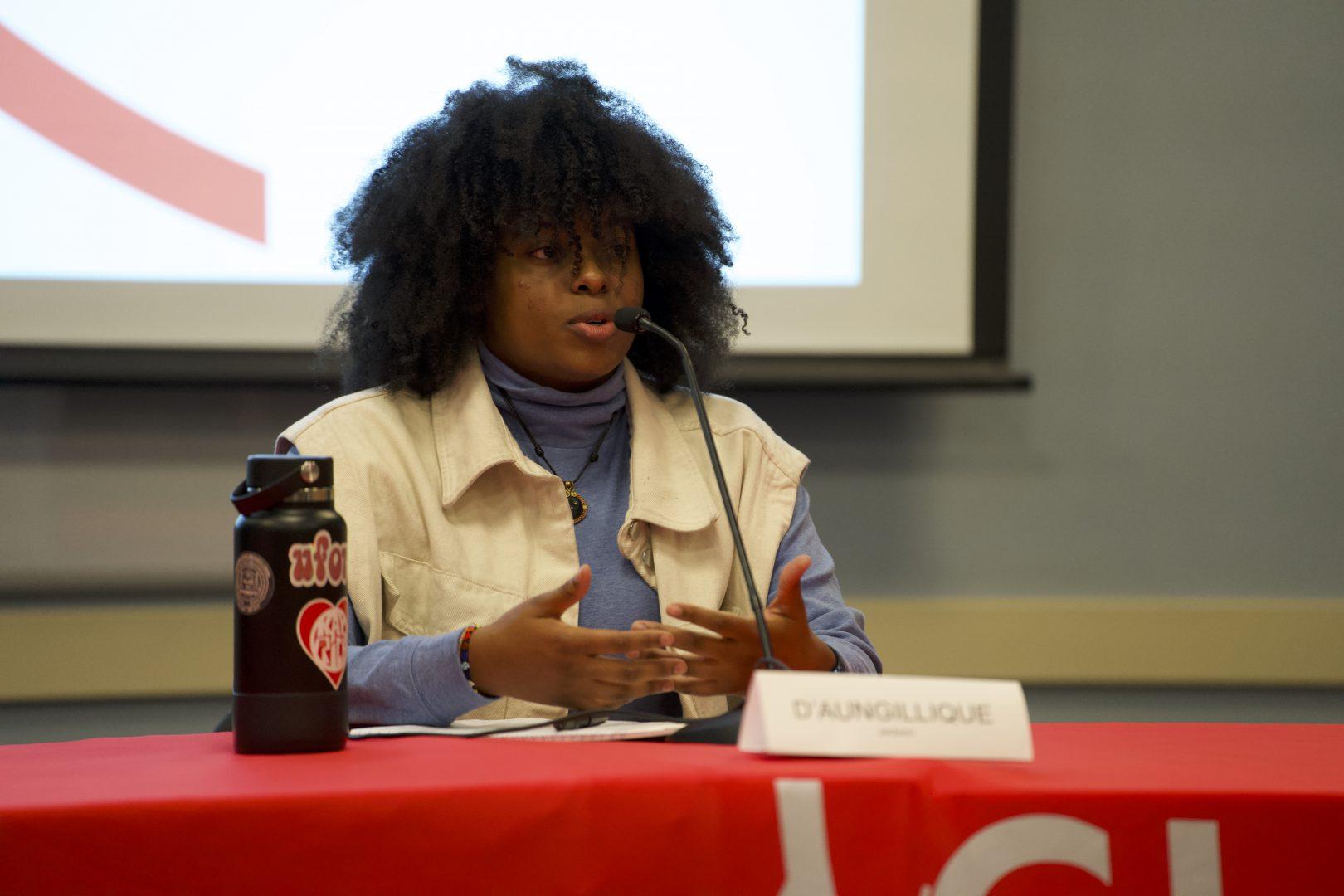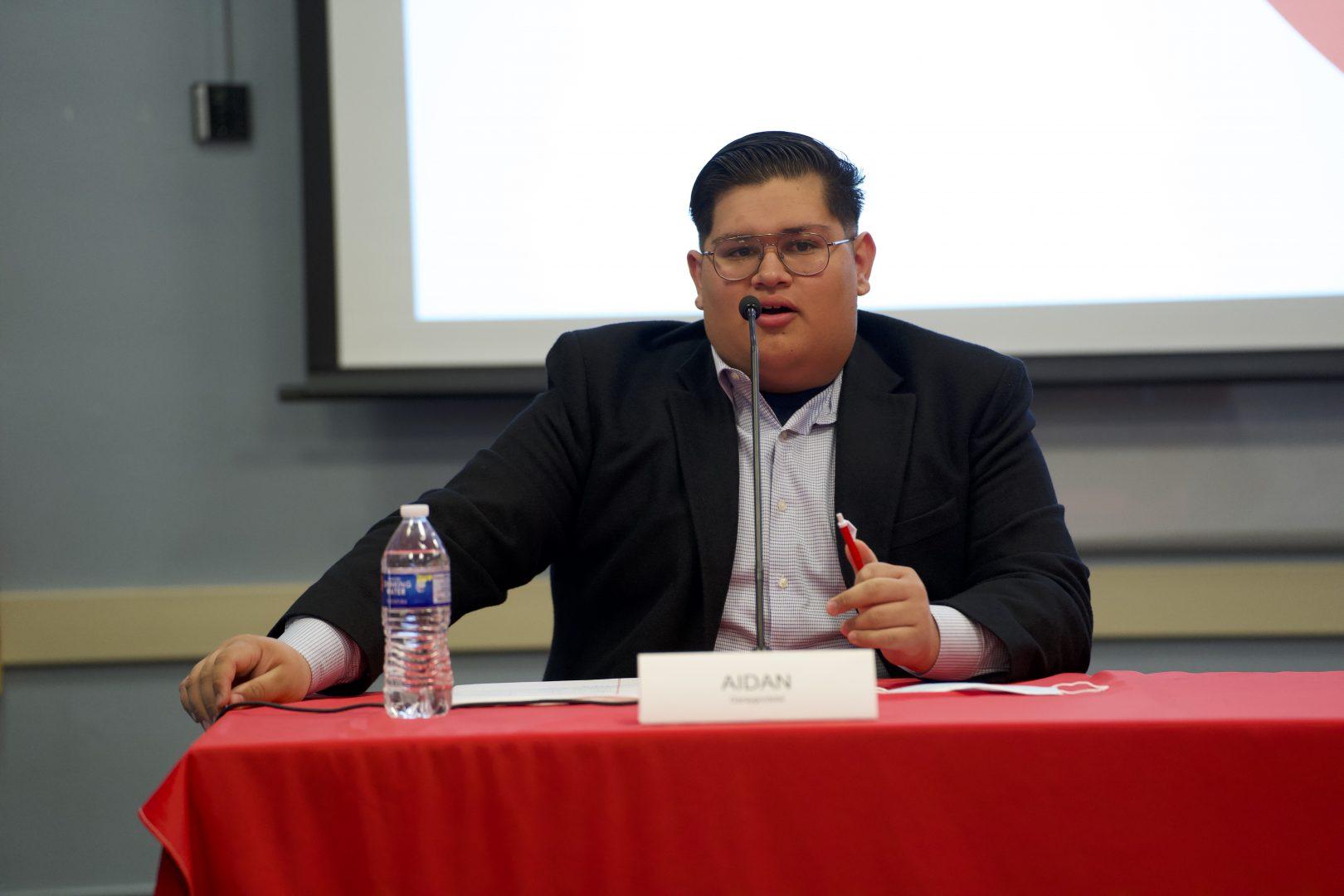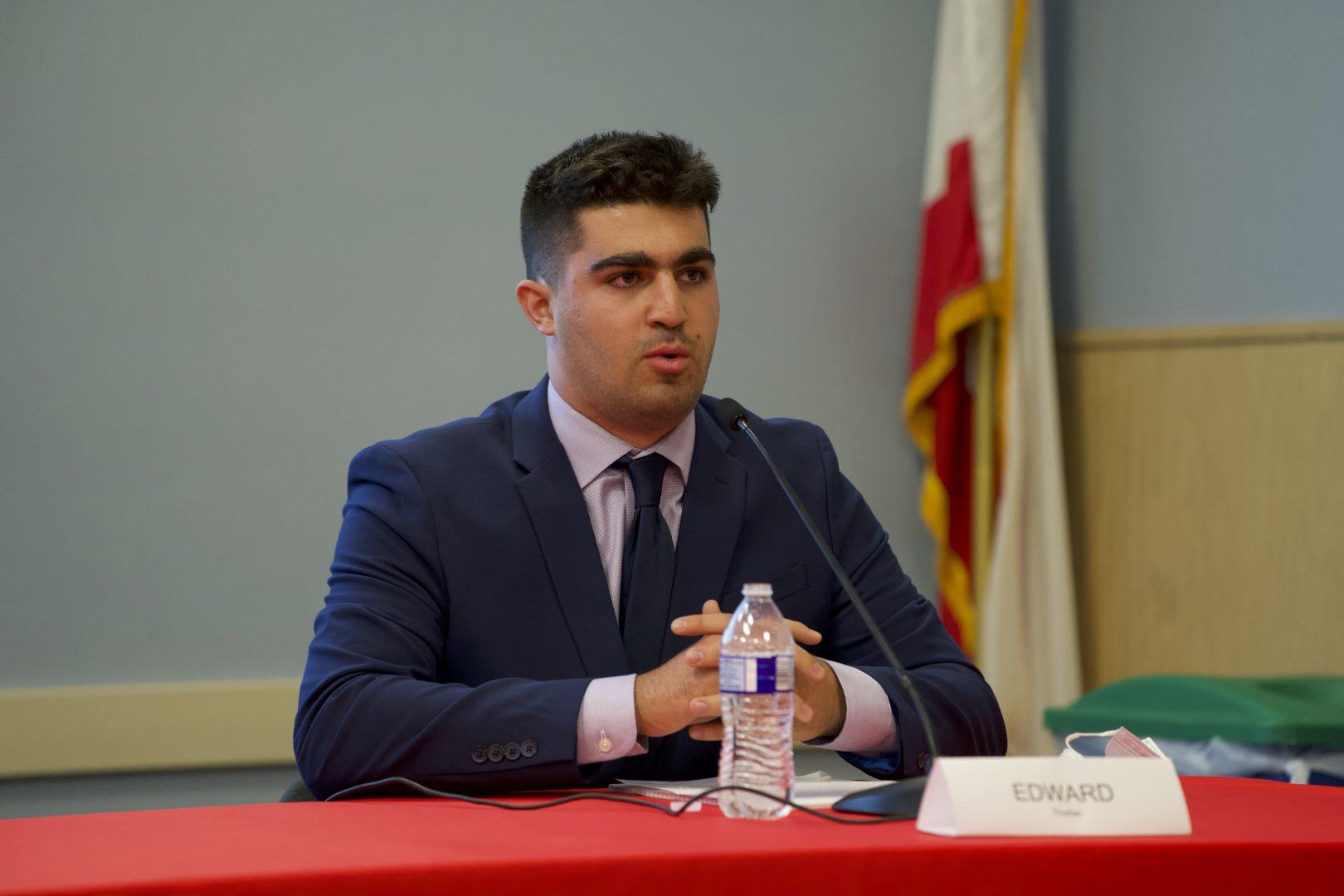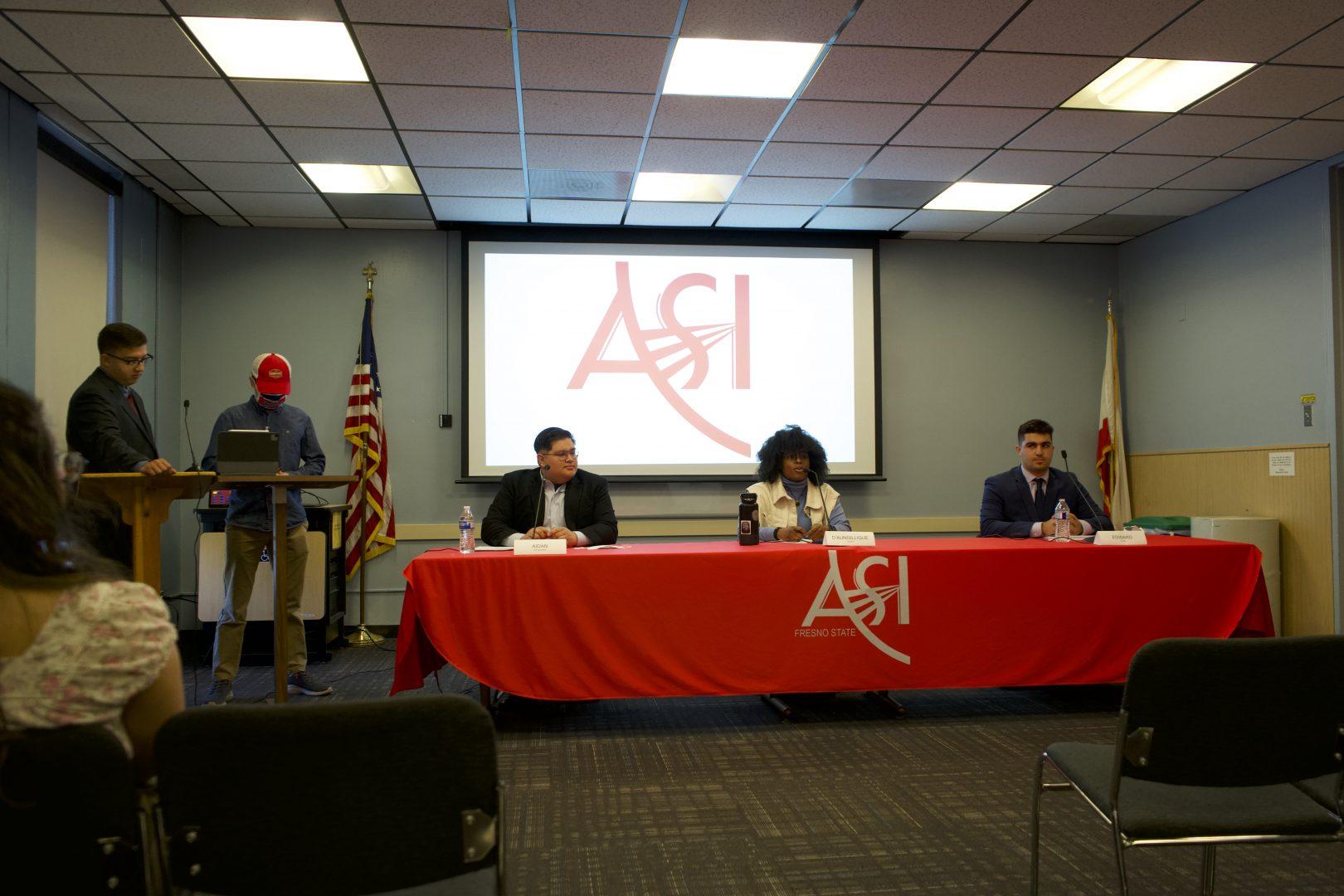Three presidential candidates spoke on campus issues and recent university controversies at the first in-person Associated Students Inc. (ASI) presidential debate since 2020 on Friday, March 18.
Presidential candidates D’Aungillique Jackson, Aidan Garaygordobil and Edward Thurber were given 90 seconds to respond. The Collegian senior news reporter Edward Lopez and reporter Adam Ricardo Solis provided questions to the candidates.
Following introductions, candidates were asked for their qualifications to serve as ASI president, with Jackson starting first.
She noted her time working with the current administration and ASI senate as the 2021-2022 ASI president and her experience as a National Civic Engagement trainer for the NAACP.
“I think the other thing is my ability to really mediate and to relationship build,” Jackson said. “I think over this last year, with us not only having a new director come into this role, but also having a lot of senators who are new to this position, one of the most important things we had to do was really start to relationship build with our university administration.”

Next to answer, Garaygordobil, current senator for the College of Arts and Humanities, emphasized his personal experience in leading various councils and committees he has been a part of.
“You have to lead the Senate and your counsel, yes, but then you also are part of a team that is trying to work toward one goal and that is bringing change,” Garaygordobil said.
Third to respond, Thurber said he has had experience in his own efforts to communicate with campus clubs, organizations and Greek life chapters at the university to understand its needs and areas for improvement on campus.
“I believe what best qualifies me for this position is my attention of the students, to the clubs I’m a part of, and the clubs I’ve talked to, and the clubs I will come talk to and continue to contact, if I’m elected, to actually bring in what they want,” Thurber said.
Presidential candidates were also asked about senator vacancies and incomplete senator reports within ASI.
Jackson said she found the current ASI structure “elitist,” as only executive ASI members are paid while senators are not despite doing the same amount of work, and she discussed potentially offering compensation for all senators.
“I think that by doing this and providing an opportunity for economic equity for the Senate, this would not only give them a chance to do what you’re talking about with these reports but really have an opportunity to do a better job with the tasks that they’re appointed or required to do,” Jackson said.
Garaygordobil said it is important to acknowledge the amount of work ASI senators do and shared Jackson’s thoughts on providing compensation for senators, also emphasizing the need to hold senators accountable.
“Yes, another thing is that each senator should be getting an incentive in terms of going about doing all this work, and the thing is holding them accountable is definitely something that we can start working on once they get an incentive to do this work,” Garaygordobil said.

Thurber also said senators should receive compensation for their work and emphasized transparency to students about ASI and the impact it will have on campus.
“I think we need to make it clear to students that this is not only an option that you can win, you can get this position and you can have a real impact and be compensated for it, but you can actually represent your group in the most effective way,” Thurber said.
In light of the controversies surrounding the mishandling of Title IX cases under the previous administration of Joseph Castro, candidates were asked about what they will do as ASI president to ensure the university improves its efforts in handling Title IX cases.
Jackson said that survivor advocate Mindy Kates was “one person serving 25,000 students and over 1,000 employees by herself” and advised Fresno State President Saúl Jiménez-Sandoval to expand the office with an additional survivor advocate and more student assistance.
“We need to ensure that our survivor advocate is getting the same training that our Title IX coordinator is doing, and I’m committed to continuing to address these issues and providing solutions that I think will work for our students, our faculty and our staff on this campus,” Jackson said.
Garaygordobil agreed with Jackson’s goal to expand the services at the university. He also said that addressing Title IX and transparency must be constant and that the university “can’t just talk about Title IX and sexual assault when a scandal happens.”
“[Campus resources] need to be promoted to students, in order for them to know that they have resources and they’re not alone,” Garaygordobil said. “They shouldn’t have to do research to figure out how they’re going to be helped on this campus.”
Thurber responded by saying that the issues highlighted the problem of “understaffed and underpaid” services on campus, sharing fellow candidates’ sentiments regarding increasing the number of survivor advocates and more support for the Title IX coordinator.
“It’s just the structural ways that we on campus are, frankly, failing our students in some ways,” Thurber said. “With regards to, for example, the blue light phones on campus, which just many of them don’t work. We need to make sure those work, so if there is an issue if someone feels uncomfortable if they’re being followed they can call for help.”

In Jackson’s closing statement, she expressed gratitude for her previous term as ASI president and said she hopes to return to her position for another academic year.
“I think that we’ve had a really rocky ride, and what we need right now going into this next academic year is consistency and leadership so we can continue to address these issues and we don’t have to start from scratch,” she said.
Garaygordobil emphasized the importance of communication with students and his goal to “really combat the problems that we’re having on campus.”
“The main point would be to reach out to students, and really, we need to expand on how they perceive the issues and how they perceive ASI… And I think if I’m elected, I would hope to lead that change here on campus,” Garaygordobil said.
In Thurber’s closing statement, he said that ASI needs to have a dynamic and changing leadership and said he found it “most important to constantly have new people bring in new ideas for the students.”
“I think it’s of vital importance that we let someone like me, who has done the work, who has gone and talked to students to figure out what they want, what they need, and what further advocacy we need to do both to administration [and] to the students, and awareness we need to raise,” Thurber said.
The 2022-2023 ASI election will begin on Tuesday, March 22 at 9:00 a.m. and will end Thursday, March 24 at noon.
ASI election results will be tallied by the League of Women Voters in University Student Union (USU) Room 308 starting 12:05 p.m. on March 24. Results will be read in the USU Bulldog Pavilion at 1 p.m.




